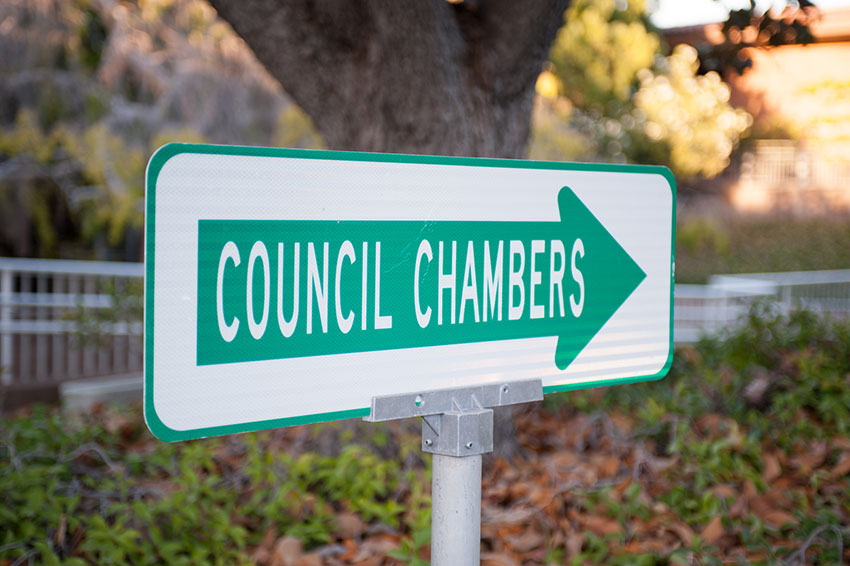The San Francisco 49ers have agreed to cease scheduling events at Levi’s Stadium that run past the City’s 10 p.m. weeknight curfew.
At a special meeting of the Santa Clara Stadium Authority Board Tuesday night, City Manager Deanna Santana told the Board that she has been in contact with the 49ers’ Stadium Management Company (ManCo) and learned that no events set to run past the curfew are scheduled.
Santana said she is unsure of the economic impact of halting such events, but she will have to do the “due diligence” to determine whether ManCo’s claims that the City will be losing between $600,000 and $800,000 per event in revenue by enforcing the curfew are accurate. She said it will take a “couple months” to “digest the numbers.”
“I think there are some discrepancies between the numbers,” she said.
Mayor Lisa Gillmor said if ManCo’s estimates are accurate, putting a stop to events that are set to run past 10 p.m. “might go both ways.”
“I believe we a going to be owed a lot of money,” she said.
Based on information from events held in 2015, if ManCo’s numbers hold up, she said the City should have seen between $4.2 and $5.6 million go into its general fund. It saw $2.6 million.
However, Council Member Patricia Mahan said she would like a memo detailing the parameters for determining when an event can go past curfew. A public campaign imploring the team to “follow the law” has caused a lot of “rhetoric” and “muddying of the waters,” she said. She made distinctions between the language in Measure J, which specifies the conditions for building the stadium, the environmental impact report and the conditions for approval of the lease agreement.
Vice Mayor Dominic Caserta called the “follow the law” campaign a “buzzword,” echoing previous comments he had made about the idea being a misnomer since the City Manager has always had the authority to extend the curfew on an event-by-event basis.
“The facts need to be made known in a way that is clear to the public,” Mahan said.
Still, City Attorney Brian Doyle rebutted these claims, saying that the team broke the law when the U2 concert ran late earlier this year because ManCo never received a curfew extension.
Noise Monitoring
Also at the special meeting, Andrew Crabtree, Director of Community Development, updated the Board on noise monitoring near the stadium.
The four noise monitoring devices the City had installed at the beginning of the summer—one each on the west and east side of Kathryn Hughes Elementary, one on Lenox Street and another on the corner of Cheeney and Lenox Streets—have been collecting data on a “continuous basis,” he said. Although the data does not delineate noise, i.e, it is simply a reading of the noise level, he said live recordings will be able to give better insight into what might be happening during a spike.
Caserta called the placement of the noise monitors “pin-pricking” a “specific business partner,” adding that he would like to examine noise levels at California’s Great America, the Convention Center and near Santa Clara University.
Crabtree said real-time information on the noise levels in the area will be available on the City’s website in January 2018.
New Litigation Rules
The Board also unanimously approved allowing the City Attorney, in compliance with new state legislation, to withhold details of City litigation from the public.
The Board authorized City Attorney Doyle to sign contracts and provide the information to its members in closed session. Making those contracts public reveals to the other litigant how much the City is spending on legal fees, which, according to a recent California Supreme Court ruling, is covered under attorney-client privilege.
Community Outreach
City Manager Santana also gave an overview of a plan to conduct research into public opinion about issues surrounding the stadium.
To eliminate bias, she said the City plans to hire an outside consultant to conduct public-opinion surveys and community outreach meetings. The goal of gathering the data is to better determine and address issues surrounding the stadium—issues such as noise, graffiti, litter and parking.
“The community will feel better once we have gathered all the data, and we can chart our way forward,” said Council Member Teresa O’Neill.
According to documents given to the Board by Santana’s office, her office will hire a consultant in November; that consultant will develop a methodology and engagement process in December, gather data and hold public meetings in January 2018, assemble the data by April 2018 and present that data and develop a plan for Council approval by May 2018.
Council Member Kathy Watanabe called the plan “thorough,” adding that she liked the “openness” and “transparency” of it.
Vice Mayor Caserta told Santana that he would like her to ensure that the consultant is not anyone from a lobbying group or that has been employed by any of the Council Members for campaigning.
“This is a big job,” said Mayor Gillmor. “This is going to give us the information we are seeking.”
The Stadium Authority will meet again 7 p.m. Tuesday Nov. 14 in the Council Chambers at City Hall, 1500 Warburton Ave. in Santa Clara.
We’d like to hear from you. To share your thoughts about this or other topics, please email your letter to scweekly@ix.netcom.com for publication. Please include your name and phone number with your submission—phone numbers will not be published. Letters to the Editor should be limited to 150 words.
